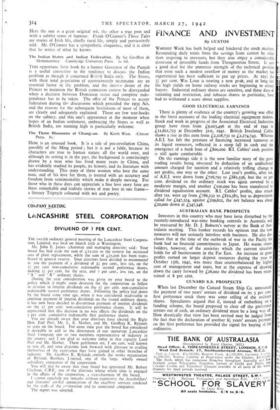FINANCE AND INVESTMENT By CUSTOS WARSHIP Week has both helped
and hindered the stock markets. Resounding daily totals from the savings front cannot be other than inspiring to investors, but they also imply a considerable diversion of invertible funds from Throgmorton Street. It sap a good deal for the immense strength of the technical position that even such a modest overflow of money as the market has experienced has been sufficient to put up prices. At ro56 the 31 per cent. Wm Loan is nearing a new peak, and at long last the high yields on home railway stocks are beginning to attract buyers. Industrial ordinary shares are sensitive, and these days of rationing and restriction, and tobacco shares in particular, have had to withstand a scare about supplies.
GOOD ELECTRICAL EARNINGS
There is plenty of evidence of the country's growing war effort in the latest accounts of the leading electrical equipment makers. Stock and work in progress of the Associated Electrical Industries group have risen from £9,003,496 at the end of 1940 to £11,621,725 at December 31st, 1941. British Insulated Cables shows a rise in this item from £2,108,731 to £2,274,743. Whereas A.E.I. has felt the pressure of financing increased turnover on its liquid resources, reflected in a steep fall in cash and the emergence of a bank loan of £800,00o B.I. Cables' cash position is still quite comfortable.
On the earnings side it is the now familiar story of the gross trading results being obscured by deduction of an undisclosed amount charged for taxation and a relatively trifling change in net profits, one way or the other. Last year's profits, after tax, of A.E.I. were down from £716,795 to £681,536, but the to per cent. dividend on the ordinary stock was again covered by a moderate margin, and another £roo,000 has been transferred to dividend equalisation account. B.I. Cables' profits, also struck after tax, were up from £786,232 to £810,385, but as depreciation called for £247,324, against £209,622, the net balande was about £20,000 down at £547,348.
AUSTRALIAN BANK PROSPECTS Investors in this country who may have been disturbed by the recently-introduced war-time banking controls in Australia will be reassured by Mr. D. J. Robarts's survey at the Bank of Aus- tralasia meeting. This banker records his opinion that the new measures will not seriously interfere with business. He also dis- closes that at the time of the outbreak of war in the Pacific his bank had no financial commitments in Japan. He warns share- holders, however, of the anxieties which the current situation holds for all businessmen in the Far East. An increase in grog profits earned on larger deposit resources during the year to October 13th, 1941, was mote than counterbalanced by higher cost of management and taxes, but at the expense of drawing down the carry forward by £26,0oo the dividend has been main- tained at 8 per cent.
CUNARD S.S. PROSPECTS
When last December the Cunard Steam Ship Co. announced the paynient of two years' arrears of dividend on its 5 per cent. first preference stock there was some selling of the ordinary shares. Speculators argued that if, instead of embarking on 3 funding scheme, the board proposed to clear off the preference arrears out of cash, an ordinary dividend must be a long way off. How drastically that view has been revised may be judged from the fact that the declaration of another 8i years' arrears payment on the first preference has provided the signal for buying of the ordinaries.


























 Previous page
Previous page